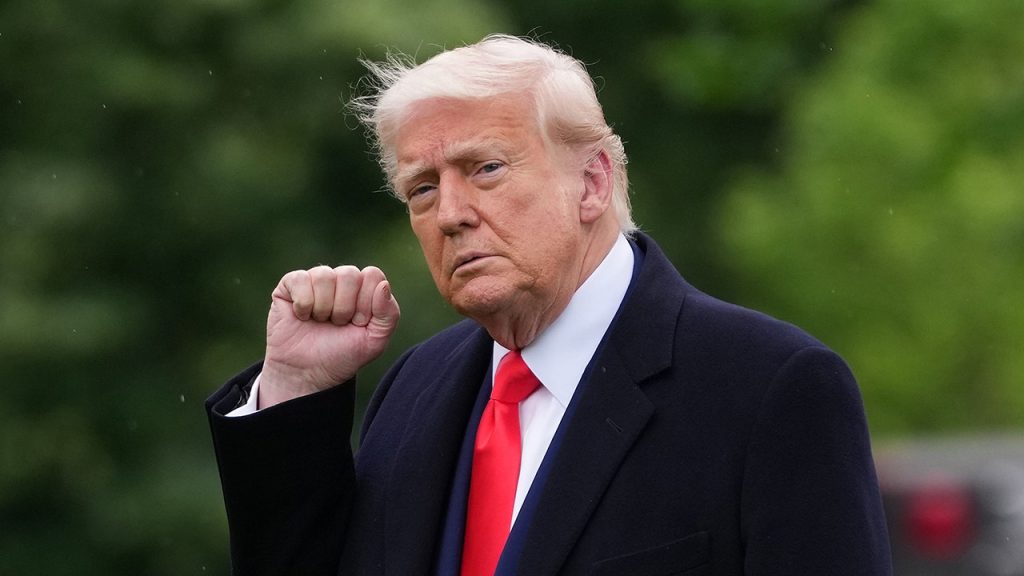On Memorial Day, President Donald Trump sparked controversy with an impassioned message posted early on Monday. The President directed his ire toward individuals he denounced as “SCUM,” claiming they have routinely worked to undermine the nation over the past four years. Despite this blunt language, Trump asserted that significant progress had been made during his tenure, hinting at a desire to galvanize supporters as the holiday approached.
| Article Subheadings |
|---|
| 1) Holiday Greetings with a Twist |
| 2) Trump’s Characterization of Opponents |
| 3) Judicial Criticism and Political Climate |
| 4) The Importance of Memorial Day |
| 5) Looking Ahead: Trump’s Future Plans |
Holiday Greetings with a Twist
On Memorial Day, Donald Trump took to social media to extend holiday greetings, but not without a unique twist that has been characteristic of his messaging style. The President sent out a post filled with capital letters—a style often noted for its intensity—which conveyed strong emotions about the nation’s current state and the challenges faced during his presidency. His words not only celebrated the holiday but also veered into a passionate diatribe against what he called “SCUM.” This greeting captures Trump’s tendency to blend formal acknowledgments with his controversial rhetoric, emphasizing a combative stance against perceived adversaries.
Trump’s Characterization of Opponents
In his Memorial Day post, Donald Trump vehemently described various groups and individuals he believes are working against the interests of the United States. He accused these entities of contributing to illegal immigration, stating that they had allowed “21,000,000 million people” to enter the country unlawfully. His statements included graphic references to criminal behavior, depicting a dire image of threats to national security. Trump’s continuous emphasis on the notion of a “warped radical left” suggests a strategy aimed at rallying support from his base by framing his opponents in stark and often extreme terms. This approach reflects his broader narrative of division in the American political landscape.
Judicial Criticism and Political Climate
Additionally, the President expressed frustration with the judiciary, calling certain judges “MONSTERS” who are allegedly obstructing the government’s ability to enforce laws. He invoked the Supreme Court as a potential savior from decisions he finds detrimental, reflecting a skewed perception of justice in America. This rhetoric illustrates the ongoing tensions between Trump’s administration and various judicial decisions, which he views as hindrances to his agenda. Recognizing that not all judges operate within his ideological framework, Trump’s remarks mirror broader sentiments among some conservatives who see judges as having overstepped their bounds in political matters.
The Importance of Memorial Day
Amidst the politically strident language in his address, the essence of Memorial Day—a day dedicated to honoring those who sacrificed their lives for the nation—remained a central theme. Memorial Day holds profound significance for Americans, often serving as a reminder of the bravery and service of military personnel. It is a day when many honor both past and present service members, reflecting on the values of sacrifice and patriotism. Trump’s message aimed to resonate with this spirit by beginning with a festive note, yet it quickly transitioned into a politically charged critique. This juxtaposition encapsulates how national observances can become platforms for political messaging.
Looking Ahead: Trump’s Future Plans
As Donald Trump seeks to bolster his political narrative, he continues to assert that progress has been made since he took office just over four months prior. His claim of having made “great progress” suggests that despite the challenges he faces, including legal battles and public scrutiny, he seeks to project a sense of competence and efficacy to his supporters. Moreover, Trump hinted at future initiatives, emphasizing a commitment to making America “safe and great again.” This forward-looking statement serves to solidify his base’s resolve while simultaneously addressing criticism regarding his governance style and decisions.
| No. | Key Points |
|---|---|
| 1 | Trump’s Memorial Day message included controversial rhetoric aimed at his opponents and judicial figures. |
| 2 | The President characterized certain judges as “MONSTERS,” reflecting his frustration with the judiciary. |
| 3 | Celebrating Memorial Day remains important, with Trump blending traditional messages with political commentary. |
| 4 | Trump asserts progress during his presidency despite ongoing legal challenges. |
| 5 | The message serves to galvanize supporters around Trump’s vision for the future of America. |
Summary
In conclusion, President Donald Trump’s Memorial Day message illustrated his typical combative style, intertwining national celebration with pointed political criticism. His depiction of opponents and judicial figures illustrates a broader narrative around division and defiance in contemporary American politics. As he aims to paint a picture of progress and future initiatives, this blend of rhetoric and observance highlights the complexities of leadership during challenging times.
Frequently Asked Questions
Question: What was the key message of Trump’s Memorial Day post?
Trump’s post combine holiday greetings with strong criticism of political opponents and the judiciary, aiming to rally his supporters.
Question: How did Trump characterize judges in his message?
He referred to some judges as “MONSTERS,” expressing frustration with their perceived obstruction of his administration’s goals.
Question: What significant challenges does Trump face during his presidency?
Trump faces legal challenges and political opposition, which he claims hinder his agenda but asserts progress has still been made.
